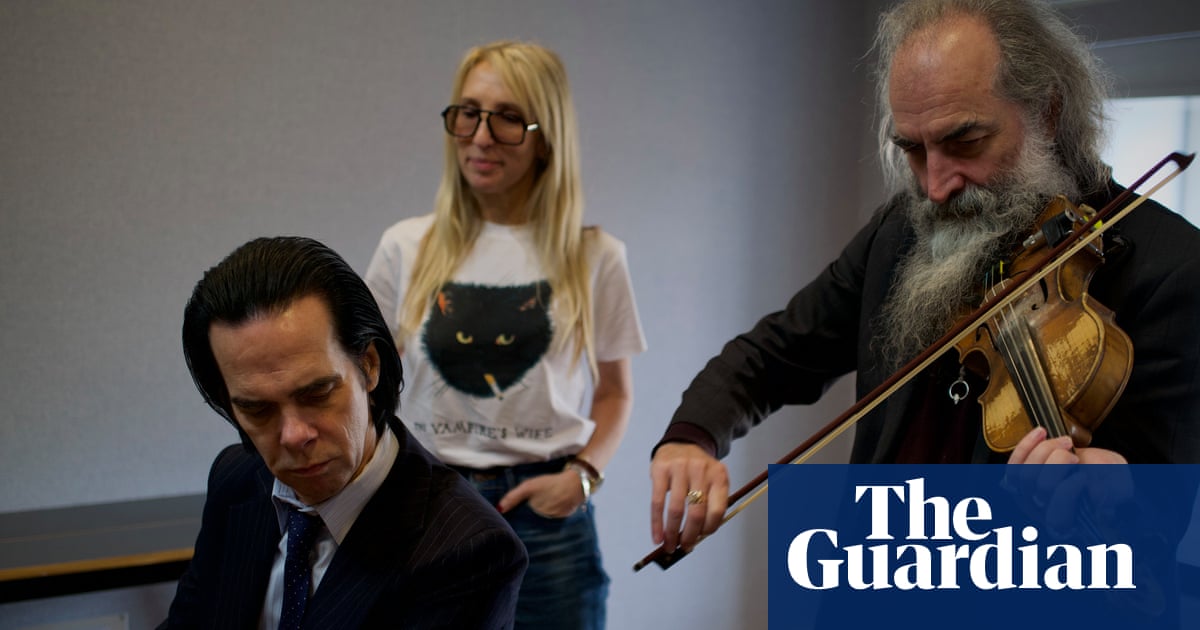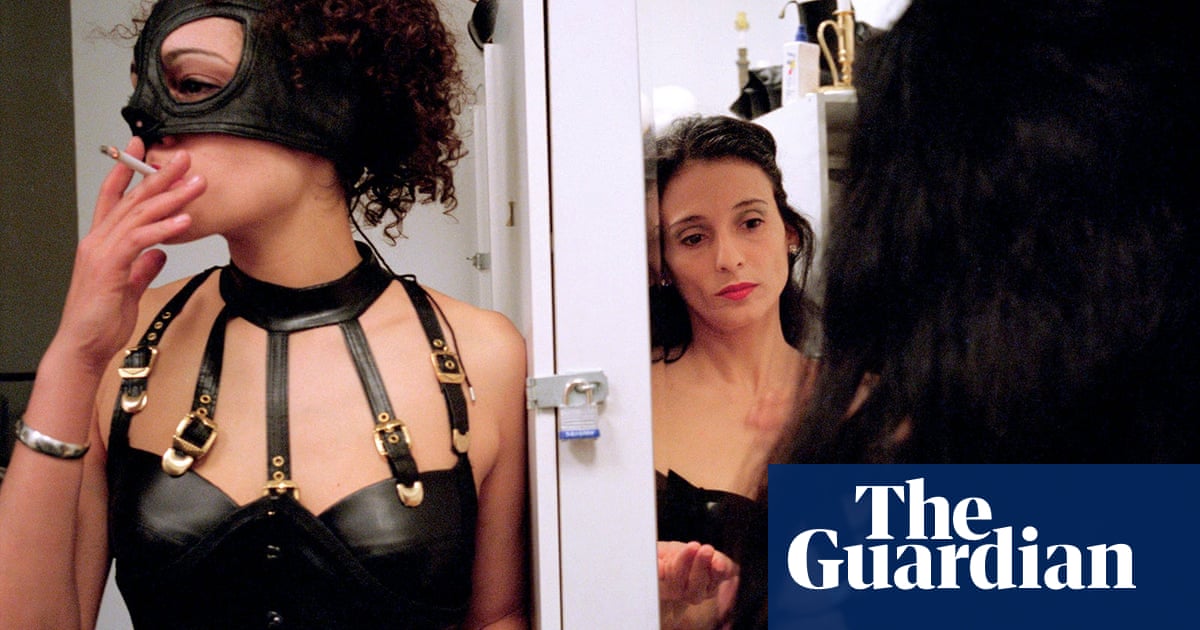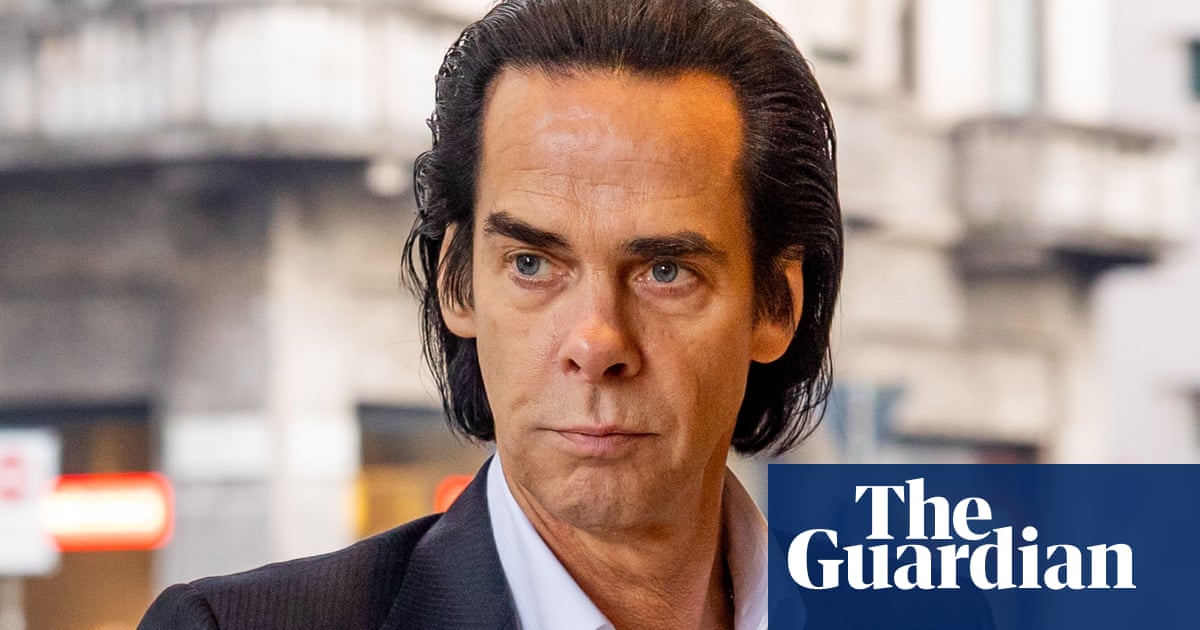
Is it normal to approach a concert by a much-loved artist with as much dread as anticipation? Nick Cave and his close collaborator Warren Ellis are touring songs drawn from Carnage – the haunting and visceral album the two made during lockdown – and from 2019’s Ghosteen, a Nick Cave and the Bad Seeds record like no other. Masks, it turns out, make excellent and discreet handkerchiefs.
Tonight, the optics suggest business as usual for an artist into his fourth decade of performing. Cave is both suave and insectoid in a dark suit. Ellis is the medieval-looking figure seated on his right on electronics, violin and flute, also suited and booted as though to disguise his real form. The two are all joints and sinew, as though consumed by the demands of the hungry-ghost music of their collaborations. To the rear is multi-instrumentalist Frenchman Johnny Hostile; three backing vocalists – T Jae Cole, Janet Rasmus and Wendi Rose – add oceanic sighs and celestial wallop to the set.
But why are there no seatbelts? This ride is not for the faint-hearted. Born from the maelstrom of grief and existential questioning resulting from the death of Cave’s teenage son Arthur in 2015, Ghosteen is not really a record. It’s an assault course for the innards in which the division between the real and the unreal dissolves and everything left is absurd – not least the kitsch Ghosteen tea towels available at the merch stall.
The Bad Seeds were supposed to tour Ghosteen; Covid intervened. Cave’s solo spoken-word tour of 2019 aside, this is the first opportunity audiences have had to hear all these songs live. “It’s a big hit,” jokes Cave as he introduces another keening track, to be met with hushed silence rather than the howls that often greet Cave’s swaggering, blood-spattered back catalogue.
Within moments, we’re straight into the metaphysics of sorrow: Bright Horses, a Ghosteen high point in which Cave wrestles with his own dazzling imagery, deciding that mundane reality is insufficient to describe all that exists. It is a recurrent theme of Ghosteen, and tonight’s set: that the material world is not the be-all and end-all, and the loved ones we have lost persist. Cave imagines “my baby” coming back to him on the 5.30 train – a nod to the locomotive as a storied musical motif, and an example of Ghosteen’s defiant, petulant commitment to magical thinking.
All the kicks to the solar plexus are here. Hollywood climaxes in the folk tale of the bereaved mother Kisa, instructed by Buddha to take a mustard seed from every household in the village that has suffered no loss. Naturally, she comes back empty-handed, because “everybody’s losing someone”. Perhaps the merch stall should consider selling empty packets of Indian spices.
On Lavender Fields, Cave is travelling “appallingly alone”. The vocalists reassure him: “There is a kingdom in the sky.” Is that really meant to comfort? In Cave’s mythos, that very same sky eats children. On Hollywood, a youngster “climbs into the sun” before his time. The song breaks down into swooping electronics and atonal sounds: Ellis and Johnny Hostile voicing the terrible loss, as though the planet were leaning over in slo-mo.
Although the reliance on oscillations can become repetitive, more often than not Ellis’s electronic spirit world rebounds, bell-like, around the concert hall’s generous acoustics. Cave is quick to point out what a “legend” Ellis is. Later, he will humorously tick off an autograph-hunter: “I’m not signing Warren Ellis’s book! I draw the line!”
That book – the recently published Nina Simone’s Gum – charts Ellis’s own mini-descent into obsession, in which a piece of chewing gum Simone discarded in 1999 becomes a sacred object. When a heckler invites Ellis to play violin on one leg – as is his custom in his band the Dirty Three – the seated Ellis bemusedly crosses one knee over the other.
As engrossing as this extraordinary music is, reality does intrude. One unexpected feature is how heavily this band rely on lecterns full of notes. You can see why the hired hands might need them, but Cave himself regularly circles back to his lyrics, occasionally flinging a page he is done with on to the floor.
By way of levity, there are older songs such as Darker With the Day (from 2001’s No More Shall We Part), whose lyrics of loss resonate anew in the wake of Ghosteen. (A double album of B-sides and rarities is due out on 22 October.) And then there are the songs from Carnage in which Cave can settle back into his terrifying old skin, gleefully detailing mankind’s beastliness. White Elephant is both louche and scary. Cave pairs an oldie, God Is in the House – about hypocritical moral rectitude – with the Carnage barnstormer Hand of God. Everyone in the band hollers and punches the air on the chorus. At one point, Cave leaps up and falls to his knees as though transported.
“That was the first – and last – knee drop of this tour,” he confides afterwards. “You can tell your grandchildren, ‘We saw Nick Cave do his last knee drop.’”












